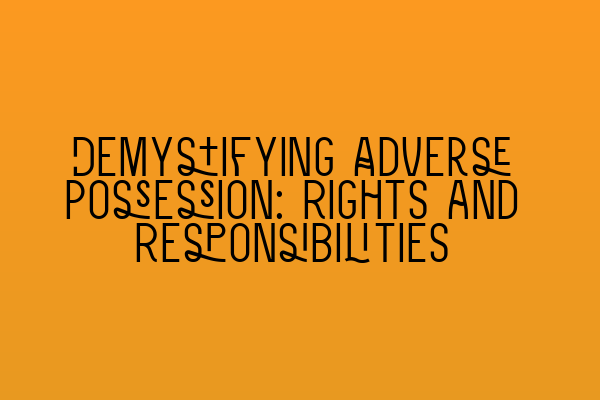Demystifying Adverse Possession: Rights and Responsibilities
When it comes to property law, one term that often sparks confusion and curiosity is “adverse possession.” The concept of adverse possession revolves around an individual gaining legal ownership of a property through continuous and exclusive possession without the owner’s consent. In this blog post, we aim to demystify the concept of adverse possession by exploring the rights and responsibilities of parties involved.
Understanding Adverse Possession
Adverse possession is a legal doctrine that allows someone who possesses another person’s land for a certain period to claim ownership of that land. This doctrine dates back to common law principles and has been incorporated into various modern legal systems, including the United Kingdom.
Adverse possession can occur in a range of circumstances, such as when a neighbor mistakenly builds a fence over their neighbor’s property line, or when someone occupies an abandoned building without the owner’s knowledge. In these cases, the adverse possessor may be able to acquire legal ownership of the property through continuous and uninterrupted possession.
It is important to note that adverse possession does not occur overnight. The adverse possessor must meet certain requirements, including open and notorious possession, continuous use, and exclusion of the true owner. Additionally, specific time limits exist, which vary depending on the jurisdiction in which the property is located.
Rights of Adverse Possessors
Once the requirements for adverse possession are met, the adverse possessor gains several rights. These rights may differ based on local laws and individual circumstances, but commonly include:
- Ownership rights: The adverse possessor becomes the legal owner of the property, with the same rights as any other property owner.
- Right to use and enjoy the property: The adverse possessor can use and enjoy the property as they see fit, subject to any applicable laws and regulations.
- Right to transfer ownership: In most cases, the adverse possessor has the ability to transfer the property to another person, just like any other property owner.
While adverse possessors gain certain rights, they also assume responsibilities and obligations. It is essential to comply with local laws and regulations, pay property taxes, and maintain the property in a reasonable condition.
Responsibilities of Adverse Possessors
Adverse possessors have several responsibilities to ensure they maintain their legal rights and avoid potential disputes. These responsibilities may include:
- Continuous possession: Adverse possessors must maintain uninterrupted possession of the property for the required period, as specified by local laws.
- Regular property maintenance: Adverse possessors should take reasonable care of the property, ensuring it remains in a habitable and safe condition.
- Payment of property taxes: Adverse possessors must fulfill their obligations to pay property taxes to the relevant authorities. Failure to do so may jeopardize their claim to the property.
- Fulfilling legal requirements: Adverse possessors should seek legal advice and adhere to the specific requirements outlined by local laws to establish and maintain their claim of adverse possession.
Understanding the rights and responsibilities of adverse possessors is crucial to navigate this complex area of property law successfully. It is advisable to consult with a professional property solicitor who specializes in adverse possession cases to ensure compliance with applicable laws and to protect your interests throughout the process.
At SQE Property Law & Land Law, we provide comprehensive legal services to assist clients in understanding adverse possession, resolving property disputes, and protecting their property rights. Contact our team of experienced solicitors today to discuss your specific situation and receive expert advice.
Related Articles:
